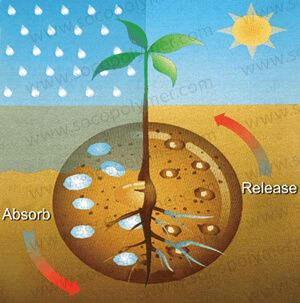The use of water holding amendments like hydrogel polymers material for enhancing water and nutrient use efficiency will become more important over time, especially in arid and semiarid regions with limiting water availability, the hydrogel able to retain water and plant nutrients and release it to the plants when surrounding soil near the root zone of plants start to dry up.
Polymer superabsorbents commonly known as hydrogels are cross-linked highly molecular compounds able to absorb water from physicochemical fluids in the amounts from 10-fold to 100-fold larger than their dry mass. Numerous investigations have shown that they can help reduce irrigation water consumption, lower the death rate of plants, improve fertilizer retention in soil and increase plant growth rate. Besides water absorption and retention, the superabsorbent polymers have many advantages over conventional ones, such as a sustained supply of nutrition to plants for a longer time, thus increasing the phosphate fertilizer use efficiency and decreasing application frequency. The aim of this study is to investigate the influence of chemical conditions on hydrogels, kinetic and absorption behaviour towards metal ions in the presence of the chelating agent of a new generation. In this group, there are IDS, EDDS, GLDA, MGDA, etc. In the chapter, the research on the applicability of the effective absorption of metal complexes with a biodegradable complexing agent will be presented. The possibility of the preparation of slow-release fertilizers of controlled activity of a new generation in such system will also be discussed.
